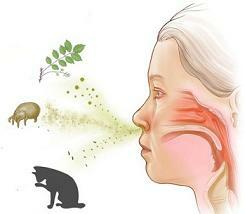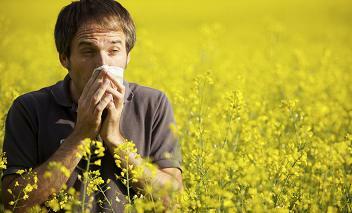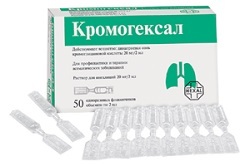 Allergic rhinitis is an inflammatory process of the nasal mucosa, which arises from the effects of various allergic stimuli, and in this case allergens.
Allergic rhinitis is an inflammatory process of the nasal mucosa, which arises from the effects of various allergic stimuli, and in this case allergens.
Simply put, allergic rhinitis is a common cold caused by an allergic reaction. Under the influence of allergens in the nasal mucosa begins inflammation, which leads to ailment. As the statistics show, rhinitis, like an allergic cough, is one of the most frequent complaints among patients who seek allergies.
This disease occurs most often in pre-school children, when the child begins to meet with substances that can cause allergies. However, cases of allergic rhinitis in adults are not rare - the symptoms and treatment of which we will consider in this article.
Forms of
Depending on the severity of allergic manifestations, rhinitis is distinguished:
- light - symptoms do not strongly disturb( may be manifested by 1-2 signs), do not affect the general condition;
- mild - symptomatic is more pronounced, there is a violation of sleep and some decrease in activity during the day;
- severe - painful symptoms, disturbed sleep, a significant decrease in efficiency, the school's progress in school is deteriorating.
The frequency and duration of manifestations are distinguished:
- periodic ( for example, in the spring during flowering of trees);
- chronic - throughout the year when the allergy is associated with the permanent presence of the
- allergens to the environment( for example, an allergy to dust mites).
- intermittent - acute episodes of the disease last no more than 4 days.per week, less than 1 month.
With recurrent rhinitis, symptoms persist for no more than four weeks. Chronic rhinitis lasts longer than 4 weeks. This disease not only represents a huge discomfort in everyday life, but can lead to the development of asthma. Therefore, if you notice a rhinitis of an allergic nature in yourself or your child, you should start treatment as soon as possible.
Causes of
Why does an allergic rhinitis occur, and what is it? Symptoms of the disease manifest themselves when the allergen hits the eye and the nasal passages of a person who are hypersensitive to certain substances and products.
The most popular allergens , which can cause an allergic rhinitis, are:
- dust, while it can be both library and home;
- plant pollen: small and light particles carried by the wind, getting on the nasal mucosa, form a reaction leading to a disease such as rhinitis.
- dust mites and pets;
- is a certain food product.
- fungal spores.
The cause of permanent allergic rhinitis, which continues throughout the year, are home dust mites, pets and molds.

Symptoms of allergic rhinitis
If the symptoms of allergic rhinitis in adults do not decrease performance and do not interfere with sleep, this indicates an easy degree of severity, moderate incidence of daytime activity and sleep indicates moderate severity. In the case of severe symptoms, in which the patient can not work normally, learn, go in for leisure during the day and sleep at night, a severe degree of rhinitis is diagnosed.
Allergic rhinitis is characterized by such basic symptoms:
- watery discharge from the nose;
- itching and burning in the nose;
- sneezing, often paroxysmal;
- nasal congestion;
- snuffling and snoring;
- change of voice;
- desire to scratch the tip of the nose;
- is an olfactory impairment.
With prolonged allergic rhinitis , due to the constant abundant secretion of secretions from the nose and the violation of permeability and drainage of the paranasal sinuses of the auditory tubes, additional symptoms also arise:
- skin irritation at the wings of the nose and above the lips, accompanied by redness and swelling;
- nasal bleeding;
- hearing impairment;
- pain in the ears;
- cough;
- sore throat.
In addition to the local symptoms of , general nonspecific symptoms are also observed. These are:
- impaired concentration;
- headache;
- malaise and weakness;
- irritability;
- headache;
- is a bad dream.
If you do not start treating allergic rhinitis in time, other allergic diseases may develop - first conjunctivitis( of allergic origin), then bronchial asthma. Whatever happens, you need to start adequate therapy on time.
Diagnosis
For the diagnosis of allergic rhinitis, it will be necessary to conduct:
- clinical blood tests on the level of eosinophils, plasma and mast cells, leukocytes, general and specific IgE antibodies;
- instrumental techniques - rhinoscopy, endoscopy, computed tomography, rhinomanometry, acoustic rhinometry;
- skin testing for the detection of causal allergens, which helps to accurately establish the nature of allergic rhinitis;
- of cytological and histological examination of nasal cavity excretions.
The most important thing in the treatment is to identify the cause of the allergy and avoid contact with the allergen if possible.
What to do with year-round allergic rhinitis
A year-round runny nose caused by an allergic reaction occurs throughout the year. Such a diagnosis is usually exhibited to a person if exacerbations of the common cold occur at least twice a day for nine months for a year.
In this case it is necessary to adhere to certain recommendations:
- to avoid rinsing the nose yourself.
- knock out blankets and pillows.
- do not use drops from the common cold.
- cleanse the nose of mucus. Do not smoke
- .
- weekly wet cleaning of the apartment.
- use bedding made of synthetic fibers.
- well ventilate the bed.
- get rid of things that are the main sources of house dust.
The basis of the development of this disease is most often a high concentration of the allergen, which for a long time affected the human body.

Treatment of allergic rhinitis
Based on the mechanisms of development of allergic rhinitis, treatment of adult patients should be directed to:
- elimination or reduction of contact with cause-significant allergens;
- elimination of allergic rhinitis symptoms( pharmacotherapy);
- carrying out of allergen-specific immunotherapy;
- application of educational programs for patients.
The primary task is to eliminate contact with the allergen detected. Without this, any treatment will only bring temporary, rather mild relief.
Antihistamines
Almost always for the treatment of allergic rhinitis in adults or children you need to take antihistamines inside. It is recommended to use medicines of the second( zodak, cetrin, klaritin) and the third( zirtek, erius, telphast) generations.
The duration of therapy is determined by a specialist, but rarely is less than 2 weeks. These tablets from allergies have almost no hypnotic effect, have a prolonged effect and effectively relieve the symptoms of allergic rhinitis within 20 minutes after ingestion.
A suffering allergic rhinitis shows an oral intake of Cetrin or Loratadin in 1 table.in a day. Cetrin, Parlazin, Zodak can be taken to children from 2 years in syrup. The most powerful antihistamine drug to date recognized Erius, the active substance Desloratadine, which is contraindicated in pregnancy, and in syrup can be taken in children older than 1 year.
Nasal wash
In the case of seasonal allergic rhinitis, treatment should be completed by washing the nose. For these purposes, it is very convenient to use an inexpensive Dolphin device. In addition, you can not buy special sachets with a solution for washing, and prepare it yourself - ¼ teaspoon of salt per glass of water, as well as ¼ teaspoon of soda, a few drops of iodine.
The nose is often washed and sprayed with seawater - Allergol, Aqua Maris, Quix, Aqualor, Atrivin-More, Dolphin, Goodwada, Physiomer, Marimer. Sea water, by the way, perfectly helps with a cold.
Vasodilating drops
Have only symptomatic effect, reduce mucosal edema and vascular reaction. The effect develops quickly, however it is short-lived. Treatment of allergic rhinitis in children is recommended to be performed without vasoconstrictive local remedies. Even a small overdose can cause the baby to stop breathing.
Stabilizers of membranes of mast cells
Allow to remove inflammatory processes in the nasal cavity. Sprays with local effects are often used.
These include cromones - Kromogeksal, Kromosol, Kromoglin. These drugs also prevent the development of an immediate body reaction to an allergen and are therefore often used as a preventive agent.

Desensitization
A method consisting in the step-by-step introduction of an allergen( for example, an extract of grass pollen) in increasing doses under the skin of the patient's shoulder. At the beginning of the injection are done at intervals of a week, and then every 6 weeks for 3 years.
As a result, the patient's immune system no longer reacts to this allergen. Desensitization is particularly effective if a person is allergic to only one allergen. Consult your doctor if it is possible to reduce the sensitivity of your immune system to an allergen.
Enterosorbents
Also for allergic rhinitis, treatment with enterosorbents has its positive effect - Polyphepan, Polysorb, Enterosgel, Filtrum STI( instructions) are agents that help to remove from the body toxins, toxins, allergens that can be used in the complex treatment of allergic manifestations.
It should be remembered that their use should be no more than 2 weeks, and reception should be carried out separately from other medicines and vitamins, as their effect and digestibility decreases.
Hormonal preparations
The disease is treated with hormonal drugs only in the absence of the effect of antihistamines and anti-inflammatory therapy. Medicines with hormones are not used for a long time, and only their physician should select them for their patient.
Forecast
For life forecast, of course, favorable. But if there is no normal and correct treatment, then the disease will necessarily progress and develop further, which can be expressed in increasing the severity of the signs of the disease( irritation of the skin under the nose and in the nose wings, pershit in the throat, cough is observed, deterioration of odor recognition,nosebleeds, severe headaches) and in the expansion of the list of cause-significant allergens-irritants.

How to choose probiotics for the intestines: a list of drugs.

Effective and inexpensive cough syrups for children and adults.

Modern non-steroidal anti-inflammatory drugs.

Review of tablets from the increased pressure of the new generation.
 Antiviral drugs are inexpensive and effective.
Antiviral drugs are inexpensive and effective.



